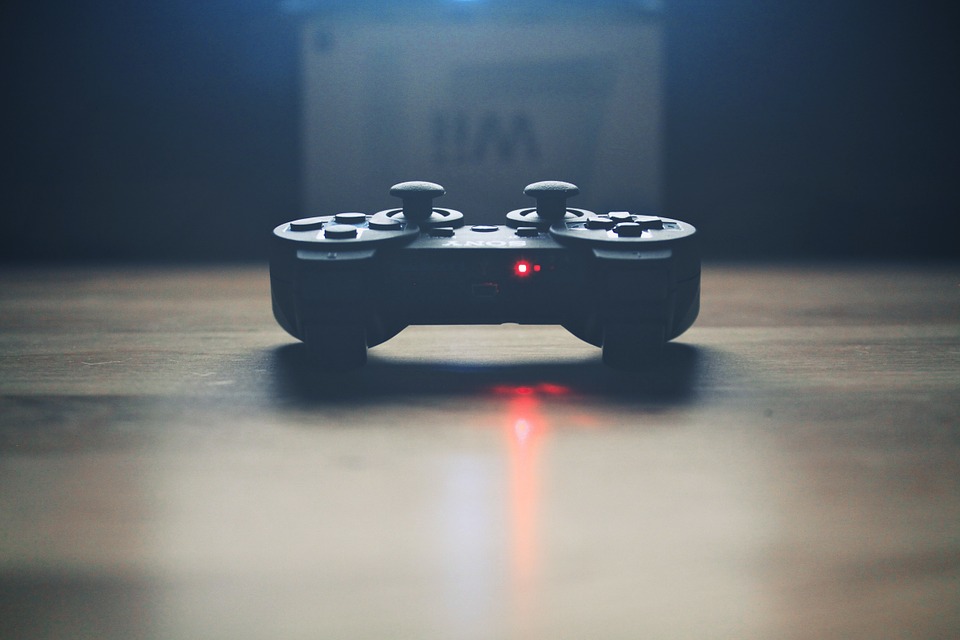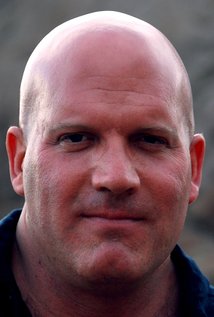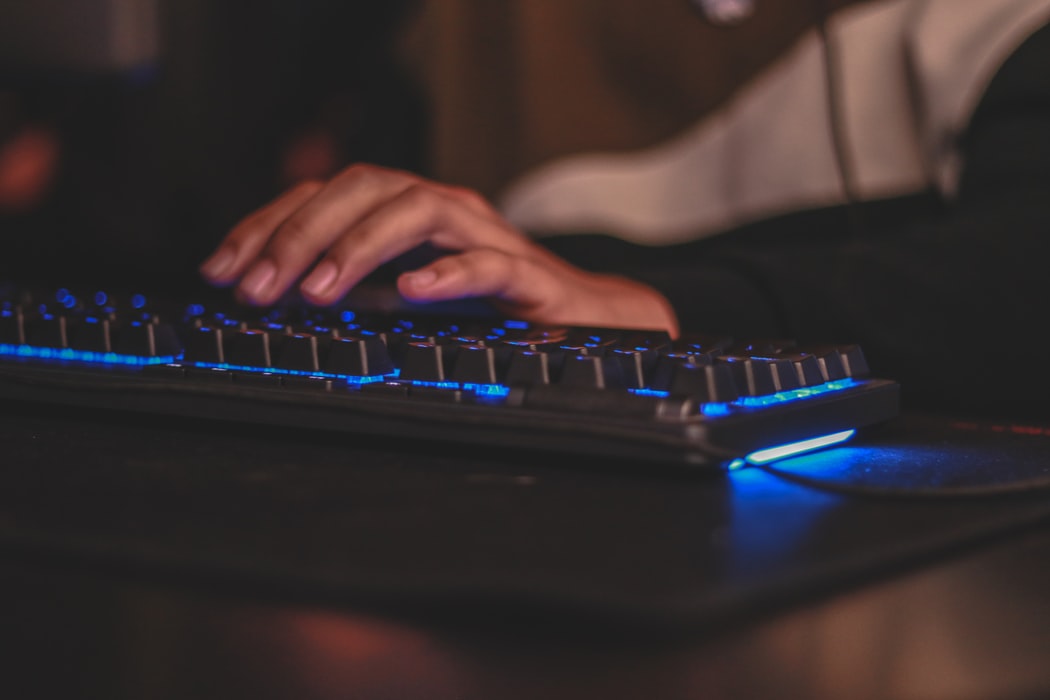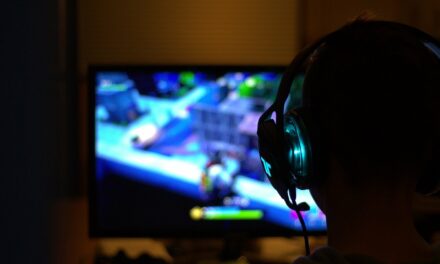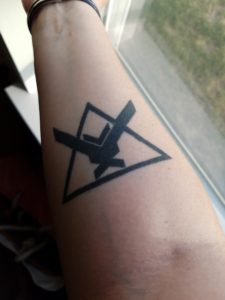 To say I’ve got a lot of tattoos is an understatement, especially since one of my tattoos goes the whole way from my knee to my shoulder. And, as is with most of us with tattoos, the ink I have functions as soul-bearing windows into my weird, weird existence. That said, in probably 90% of these cases, that means my tattoos are soaked in my cherished geekdoms: Lord of the Rings, Doctor Who, Fullmetal Alchemist, etc. The list goes on and I’m running out of skin.
To say I’ve got a lot of tattoos is an understatement, especially since one of my tattoos goes the whole way from my knee to my shoulder. And, as is with most of us with tattoos, the ink I have functions as soul-bearing windows into my weird, weird existence. That said, in probably 90% of these cases, that means my tattoos are soaked in my cherished geekdoms: Lord of the Rings, Doctor Who, Fullmetal Alchemist, etc. The list goes on and I’m running out of skin.
But of all of my geek-hearted tattoos, the Halo tattoo represents one of the most poignant of my gaming influences. A basic, hollow black triangle with a simple, inverted chevron that resembles wings. This militaristic symbol is from the Halo: Reach (my first Halo) loading menu and is meant to be an immovable reminder that I am a super-human, badass Spartan from the Halo franchise.
See, my life deteriorated kinda quickly in the early years after college. A long list of depressing diagnoses gained momentum every year and I collected unpronounceable diseases like Pokemon. I left the veterinary career that I worked so hard for and that gave me a strong sense of purpose because I could no longer physically perform. There were no other solutions. I felt abandoned, unworthy and a stranger in a broken form that I couldn’t recognize.
But during the decline was when I found Halo. And despite repeated downfalls on my body’s behalf, I became good at something through repeat performance, strategy and practice. Halo didn’t care about what my body couldn’t perform. I’d sit with multiple swollen joints propped up, Ace-wrapped and iced, but could still soar as a Spartan. Better yet; as I started to improve at Halo, I started to improve in life. To improve at Halo, I had to analyze why I was failing. As I got better at this type of analysis, I began to apply the same Halo-practiced approaches to my actual life. Through this, I started to regain the control I had lost when my body failed.
Even though I haven’t actively played Halo in a few years, there have been many times when I’ve been in the ER, or crumpled in a fetal position and in significant, barely functional pain, feeling at the end of the rope with a body of betrayals, but when my glance catches the Spartan symbol, I find a restored my will to fight. These are my battles and despite how unfair it is, I fight and overcome my own super-human battles just like any Spartan.
The more I read, the more I find I am by no means the only human to overcome shortcomings and disabilities by utilizing video games. While many debates rage on regarding the amount of time modern generations spend gaming and whether physical violence is equated to time playing violent games, critical reviews overlook the positive influence video games create, especially for those of us that have to live life differently due to disabilities.
In a recent story published on The Mighty (a website and platform for discussions on all facets of disabilities), Catherine Soper discussed how video games provided her with powerful mechanisms for her life with cerebral palsy. Catherine says that after being gifted a Playstation at 11 years old and feeding herself steady diet of Final Fantasy VIII, she easily fell in love with video games and three important gifts arose from her gaming experiences.
First, gaming gave her a level playing field. It didn’t matter that she couldn’t run or catch a ball; she could still excel in video games regardless of physical differences. Second, she found that gaming actually helped improve the coordination in her hands.
Usually, Catherine says she would avoid using her left hand due to weakness from hemiplegia, but gaming required the use of both hands. Gaming became a source of physical therapy that slowly strengthened her abilities in an otherwise limited hand. Finally, Catherine found gaming to be a supreme outlet for frustration of being different. In her own stupendously brilliant words:
Playing video games let me escape into another world where I wasn’t subject to the physical limitations of my cerebral palsy. I couldn’t play netball? That’s OK; I was way too busy saving the world from imminent destruction anyway.
Catherine’s story coincides with so many disabled gamers, but not only have those with disabilities found respite in video gaming, but they have begun to dominate the world of famous video gamers and broadcasters. Among some of the most famous are ApocalypticKitten, TheRealHandi, NoHandsKen, and Brolilegs. These casters have created an environment where disabilities don’t matter and gaming abilities do.
There is even a collection of stories about how video games have saved lives. From 2008 through early 2016, many of us web-dwelling dorks enjoyed the hilarious hi-jinx of the video game comedy sketches known as “Hey Ash Whatcha Playin’?” starring Ashly Burch and her brother Anthony Burch. After HAWP took off, Ashly created How Games Saved My Life in 2011. In an interview with Ars Technica, she stated “I did it because games aren’t taken seriously as a medium, and they need to be. There’s this stigma that’s just clinging on for dear life that games are adolescent, violent, dangerous, et cetera.”

How Games Saved My Life became a beautiful, lengthy list of story submissions for how video games had helped numerous people cope with everything from drug addiction to break ups to abusive relationships and beyond. But amongst the list of stories, more stories of how video games helped those with disabilities overcome are boldly present: stories such as How Halo Helped Me Cope with Chemotherapy, So Stressed, I’m Pulling My Hair Out (about trichotillomania and anxiety) and Ashly’s own story, How Harvest Moon Saved My Stomach Lining. Ashly’s story told of her own struggle with debilitating anxiety with resultant digestive distress, but playing Harvest Moon helped her soothe demanding and overwhelming anxieties.
While most of the How Gaming Saved My Life stories came from 2011 and 2012, the Tumblr is still available and is as important and compelling as it was in 2011.
With an ever-growing list of gamers that cherish the experience and are keenly aware of the benefits of gaming, it’s also no surprise that magnificent organizations have arisen to give help provide others with the wealth that video games have provided.
 In the case of Get-Well Gamers, children in hospitals are provided with a needed and therapeutic escape through gaming. Get-Well Gamers is a 501K charity that began in 2001 and is based in California.
In the case of Get-Well Gamers, children in hospitals are provided with a needed and therapeutic escape through gaming. Get-Well Gamers is a 501K charity that began in 2001 and is based in California.
The organization has helped provide substantial video gaming options for over 200 children’s hospitals worldwide and function for important reasons, as stated on the organization’s About Us description:
Video games are an effective and proven pain management tool and provide needed entertainment during long hospital stays.
Some of their methods of collecting donations involve sponsored stream-a-thons from famous Twitch users and their eBay page, which features retro games auctioned solely for their charity. They also accept and distribute directly donated video games.
Gamers themselves are not the only one to acknowledge the benefits of video games in the face of adversity, however. Gaming platform Playstation has provided solutions for those with disabilities. According to a NowThis video posted by Upworthy that premiered in the last week, Playstation removed a significant accessibility barrier for 21-year-old student Peter Byrne, who was having difficulties with controllers due to his cerebral palsy. After Peter emailed Playstation regarding issues with standard controllers, Playstation not only sent him a custom controller, but also provided a meaningful note from a Playstation employee that included “It killed me to hear how something you used to thoroughly enjoy was ruined because of our controller design.
And despite varying opinions on whether virtual reality (VR) is should be considered a part of the video gaming realm or in a realm of its own, video games were one of the original, solid inspirations for video games and remain one of the largest uses for VR. Doctors have recently discovered that VR is way more than just escaping a boring day.
In a video recently released by Quartz, doctors had miraculous outcomes using VR with quadriplegic patients. Initially, the end-goal was to simply to produce exoskeleton robots to help quadriplegics walk, but a massive discovery transformed the development into a study when patients began to move and have feeling in their limbs again.
In the first brain-machine interface study for this type of injury, the eight patients with spinal injuries that had resulted in waist-down paralysis used Oculus VR headsets for an hour a day twice a week, and with training they were provided, utilized brainwaves to control a virtual avatar of themselves walking and moving while attached to the robotic exoskeletal legs.
By monitoring and using the brainwaves, doctors managed to convince the brain into thinking the patients were actually walking. While they still cannot walk, patients began regaining motor skills and sensation in their paralyzed limb.Scientists are hypothesizing that the “virtual walking” that was accomplished by Oculus headset essentially restarted the communications between remaining muscle receptors and nerves in the paralyzed legs. Further, according to the head researcher, Dr. Miguel Nicholelis, some even regained some bladder and bowel function and thus some control over their daily routine.
The outcome of the study has given these patients an enormous, positive change in the quality of life. All patients that maintained training within study guidelines have since been reclassified as partially paralyzed. Researchers are also hoping that the dynamics of this study can overlap to help other neurological issues such as stroke.
Slowly but surely, gamers are changing the conversations about video games and these types of stories are no longer just outliers. There is an ever-growing wealth of acknowledgement in the value of video games, especially for those with disabilities. Regardless of disability type or severity, if you are struggling, certainly see the necessary professionals, but maybe also consider the escape and leveled playing field found in the world of video games.
Game on, gamers. We’ve got worlds to conquer, our own included.

